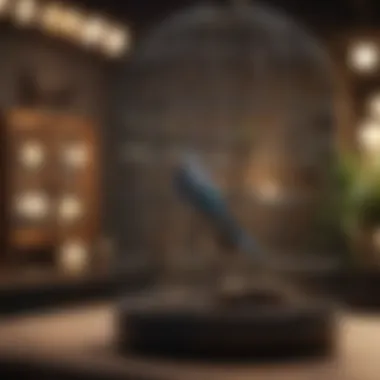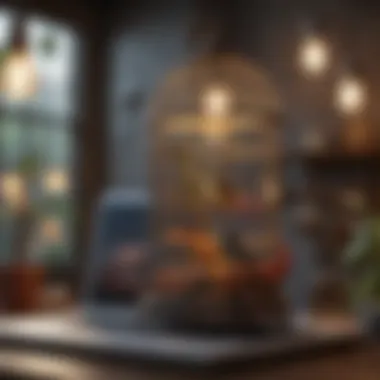Where to Buy Bird Cages: Your Ultimate Buying Guide


Intro
Purchasing a bird cage isn't just about choosing a pretty box for your feathered friend; it’s a decision that can influence their well-being significantly. Birds are complex creatures with diverse needs, and understanding those needs is fundamentally tied to the type of habitat you create for them.
In this guide, we will explore the crucial aspects of selecting the right bird cage, from different styles and sizes to the essential accessories that can enhance your pet's quality of life. Moreover, we will highlight key considerations such as bird species, their natural behaviors, and the budget you'll need to keep in mind. Knowing where to shop, whether physically or online, will also be discussed, ensuring you can find exactly what you need without breaking the bank.
With that said, let’s dive into the foundational principles of avian care by first exploring the intricacies of bird cages.
Understanding Bird Cages
When considering the journey toward welcoming a feathered companion into your life, understanding bird cages becomes essential. A suitable cage serves as more than just a shelter; it’s a sanctuary where our avian friends can thrive and exhibit natural behaviors. A proper enclosure lays the groundwork for your bird’s health and happiness. If you neglect to provide an appropriate cage, you risk not only their well-being but also the joy that a content bird can bring to your home.
Importance of a Proper Cage
Providing a proper cage is crucial for several reasons. First and foremost, it ensures safety; your bird will be protected from potential hazards in your living space. A well-structured cage allows for enough room to fly, play, and socialize, directly affecting their physical and mental health. For instance, larger birds like cockatoos require ample vertical space to stretch their wings without restraint.
Moreover, a thoughtfully designed cage can aid in behavioral enrichment. Birds often exhibit curiosity, and they thrive in environments that offer stimulation. This can range from perches that allow climbing to toys that encourage foraging. Thus, investing in a quality cage should never be an afterthought—it should be your top priority when preparing to bring home your new pet.
Types of Bird Cages
When selecting the right cage for your feathered friend, understanding the various types is imperative. Each cage type caters to different needs, allowing bird owners to make informed choices.
Aviary Cages
Aviary cages provide spacious environments ideal for keeping multiple birds or even a single bird that requires ample space. One of their biggest highlights is the generous square footage, which often includes multiple levels for climbing and playing. This setup mimics a natural habitat, encouraging birds to engage in social interactions and exercise. The airy structure allows for adequate airflow and light, contributing to a healthier living condition. However, they can take up considerable space in your home, so they might not suit smaller apartments.
Flight Cages
Flight cages are designed with mobility in mind. They typically have horizontal bars that allow birds to spread their wings and glide—excellent for species that need to exercise often. Many owners choose flight cages for birds who need more than just a perch to stay happy and healthy. A unique feature of these cages is that they often come with additional accessories, like ladders and swings, promoting various forms of play. It's essential, however, to ensure these cages are spacious enough, or your birds might feel cramped.
Travel Cages
Travel cages are perfect for bird owners who frequently take their pets on the go. Light and portable, these cages are designed with safety in mind, often outfitted with secure locks. A notable characteristic is their compact size, making them easy to fit in a car or take on a plane. However, travel cages usually have limited space, so they should be used for short durations rather than as a permanent home. Some birds may feel cramped for extended trips, so it’s wise to use them for travel only.
Acrylic Cages
Acrylic cages have gained popularity due to their modern design and ease of visibility. Made of durable plastic, they often feature clear, solid walls that allow for an unobstructed view of your bird. This characteristic can make them visually appealing and ease interaction with your feathered companion. However, while they are easy to clean, they generally lack ventilation compared to traditional metal cages. Therefore, it's critical to ensure that the structure allows for airflow, as stagnant air can impact your bird's health.
Factors to Consider Before Purchasing
When it comes to buying a bird cage, there are a multitude of factors that require your attention. Each detail you consider can greatly impact the well-being and happiness of your feathered companion. From the size of the cage to the material it's made of, each choice carries weight. By prioritizing the needs of your pet bird, you can create a space where they can thrive.
Size Requirements Based on Bird Species
Small Birds
Small birds like budgerigars or finches often require a cage that offers enough space for them to flutter without feeling cramped. Their cages should be tall rather than wide, considering they enjoy climbing. A well-sized cage for small birds allows them to spread their wings, which is crucial for their well-being.
One benefit of small birds is their sociable nature; they thrive when kept in pairs or small groups. However, keep in mind that a smaller cage can limit their social interaction if it's overcrowded. Ensuring the right size cage for these birds means looking beyond mere dimensions—it also involves understanding their specific needs for space and interaction.
Medium Birds
Medium species, such as conures or cockatiels, need cages that provide a balance between space and comfort. Generally, a cage about two feet wide is suitable, with enough vertical space for climbing. Medium birds are known for their playfulness and inquisitive behaviors. A cage that allows them to swing and perch comfortably enhances their overall emotional health.
It’s important to note that the risk of boredom is a big consideration for medium birds. A cage that is merely large enough won’t support their active lifestyles. Rather, opt for a design that allows for diverse activities—this fosters both engagement and health.
Large Birds
For large birds, such as African grey parrots or macaws, cage size is critical. These birds require expansive cages, preferably up to 4 feet wide and tall, allowing them ample space to stretch and play. Large birds are more demanding in terms of space, as they are often more intelligent and need stimulation to remain happy.
Choosing a large cage means also considering its width and shape, not just height. A spacious environment encourages exploration and reduces behavioral issues caused by confinement. Be cautious, however, as large cages can take up substantial room in your house, so always measure the intended area beforehand.
Material Choices


Metal vs. Plastic
When deciding on cage materials, metal and plastic are the two primary choices. Metal cages, often made of wrought iron or stainless steel, are highly durable and stand the test of time. They resist chewing and scratching from all but the most determined birds, ensuring a long life for the investment. A downside could be rusting if the coating is not of high quality, so always check for durability.
On the other hand, plastic cages tend to be lighter and often travel-friendly. However, their susceptibility to damage from beaks makes them less practical in the long run. Over time, scratches and wear can harbor bacteria, posing health risks for your bird.
Non-toxic Coatings
The coatings on cages need careful consideration as well. Non-toxic coatings are vital for ensuring the health of your bird. Regular paints and finishes can leach harmful chemicals, especially if the bird has a habit of chewing on surfaces. Look for cages specifically labeled as bird-safe and free from zinc or lead.
Choosing cages with non-toxic coatings also reflects your commitment to the well-being of your pet. These coatings not only protect your bird but can contribute to a longer-lasting product. The investment is worth the peace of mind.
Bar Spacing Considerations
Bar spacing is another critical element in cage selection. Inadequate spacing can lead to accidents, such as a bird getting stuck. For small birds, spacing should typically range from ½ to ¾ inches, whereas larger birds will need wider spacing to ensure they can’t fit their heads through. This serves as not just a safety measure, but also ensures the birds feel secure within their cages.
Cage Shape and Design
Rectangular vs. Round
The shape of your bird's cage can seriously influence their lifestyle. Rectangular cages tend to offer more usable space which is vital for climbing and movement. In most cases, these cages provide the best configuration for play, while the flat surface allows for easy placement of accessories and toys. Meanwhile, round cages create the illusion of naturalistic spaces, but often sacrifice practical area for movement.
Corner Cages
Lastly, corner cages are a creative option for tighter living spaces. These unique designs make use of corners in your home, allowing for a snug fit. Nevertheless, be mindful that these shapes can limit accessibility and visibility for birds. Ensure you're placing the cage where your bird can see what's happening around them—perception is key for their emotional well-being.
Overall, considering these factors before purchasing will provide a solid foundation for your bird's happiness and health. The right cage not only serves as a home but becomes a vital aspect of their routine.
Budgeting for a Bird Cage
When it comes to bringing a feathered companion into your home, one of the most crucial aspects to consider is budgeting for a bird cage. A bird cage isn't just a stylish accessory for your pet; it's a foundational investment that plays a significant role in your bird's health and happiness. Getting the right cage—it’s not just about price; it’s about value, longevity, and the overall well-being of your bird.
Understanding how much to allocate for a bird cage requires an examination of various factors. All cages are not created equal; they come in different shapes, sizes, and materials. Therefore, knowing the type of bird you have and its specific needs can set the stage for a suitable budget.
Here are some major considerations related to budgeting for a bird cage that are worth thinking about:
- Long-term investment: Quality cages may cost more upfront, but they tend to last longer, generating less need for replacements.
- Ongoing costs: Beyond the initial purchase, consider costs associated with maintenance, such as replacement perches, toys, or even new accessories down the line.
- Potential healthcare: Sufficient funds for a quality cage can also indirectly relate to your bird's health, potentially avoiding expensive vet visits.
Price Ranges Overview
Bird cages typically vary widely in price, and understanding these ranges can help you pinpoint what to expect. On one hand, you might stumble across smaller cages meant for canaries or finches priced as low as $30. These cages often feature simple designs and limited features; they are generally short-term solutions. On the other hand, larger aviaries suitable for parakeets or cockatiels may start around $150 and can easily climb into the thousands for robust, well-constructed options.
Here’s a general breakdown of bird cage price ranges:
- Basic cages for small birds: $30 - $75
- Medium-sized cages for parrots: $75 - $300
- Large aviaries: $300 - $1,000 or more
While diving too deep into price can lead to making hasty decisions, it’s important to assess what’s within your budget while ensuring the safety and comfort of your bird.
Cost vs. Quality Analysis
In many cases, you get what you pay for when it comes to bird cages. A low-priced cage may initially seem like a bargain, but upon closer inspection, it may lack essential features like sturdy materials or non-toxic finishes. Quality cages are typically more durable, have better craftsmanship, and are made of materials safer for birds. For instance, metal cages coated with non-toxic finishes are generally superior to those made from plastic, especially regarding durability and ease of cleaning. So, while it may be tempting to opt for the cheaper alternative, consider the long-term investment in both your bird's environment and overall health.
Also, factor in the following when evaluating cost versus quality:
- Welds and joints: Ensure they are secure and won't pose a risk to your bird.
- Materials: Look for stainless steel or powder-coated metal options, as they are safer and longer-lasting.
- Cage features: Quality cages usually come equipped with accessories like removable trays and easy access doors, making maintenance simpler.
Long-term Expense Considerations
Another essential factor in budgeting for a bird cage is to recognize that the initial purchase is just a drop in the bucket. After you’ve invested in the main structure, think about supplementary costs that may arise over time. This might include:
- Resupply of clean-up materials like liners or pads for the bottom of the cage.
- Accessories such as new toys, perches, or food and water dishes that will need to be replaced periodically, which can add up.
- Maintenance tools, including brushes for cleaning hard-to-reach spots, or bird-safe disinfectants, as a clean cage significantly contributes to your bird’s health.
Keeping these factors in the forefront while budgeting can save you from unpleasant surprises and ensure your bird thrives in a well-maintained environment. Always remember that a larger upfront investment may lead to lower costs over a bird’s lifetime—a home run for both you and your new avian friend.


Where to Buy Bird Cages
Buying the right bird cage is essential for every avian enthusiast. It's not just about picking a decorative box; it's about ensuring a safe, comfortable, and stimulating environment for your feathered companion. Where you choose to buy your bird cage significantly influences aspects like price, variety, and even the quality of the products available.
As you embark on this journey, consider the following elements:
- Variety of Options: Different sellers offer various cage types, sizes, and styles, allowing you to find one that matches your bird’s needs.
- Price Comparisons: Knowing where to shop can help you locate the best deals, ultimately saving you a few bucks.
- Customer Support: When purchasing from reputable stores or online retailers, you benefit from customer service that can assist in your decision-making process.
Without a doubt, finding a suitable bird cage requires thorough research and consideration. Let's delve into the options available to you, starting with online retail avenues.
Online Retail Options
Amazon
Amazon is arguably one of the most well-known platforms for buying nearly anything, including bird cages. The vast selection on Amazon allows you to filter results by price, customer ratings, and specific cage features. This means you can find suitable options that fit your budget and your bird's needs all in one place.
One of the key characteristics of Amazon is its user reviews. You can read what other bird owners think about specific cages, which can be a tremendous help. However, it's worth noting that with such extensive choice, it might be a bit overwhelming to narrow it down and you might need a keen eye to sift through the reviews.
Chewy
Chewy provides a more niche approach to pet products, focusing specifically on the needs of pet owners. Their bird cage inventory is thoughtfully curated, ensuring that the options available are safe and suitable for birds, which can give buyers peace of mind. Chewy also stands out with its customer service, often praised for being responsive and informed.
An interesting feature of Chewy is their auto-ship option. If you find a cage or supplies your bird needs consistently, you can set regular deliveries, taking the hassle out of shopping.
Specialty Pet Stores
Specialty pet stores focus exclusively on the needs of various pets, including birds. Unlike general retailers, these shops often provide a knowledgeable staff that can offer personalized advice. This means you don’t just get a cage, but also insight into what type might suit your specific bird best.
The unique offer here lies in seeing the cage in person. You can assess sizes, materials, and designs directly, which can be a far more satisfying experience than buying online. However, prices can be slightly higher at these retailers, so keep an eye on your budget.
Local Brick-and-Mortar Stores
Pet Supply Shops
Visiting a local pet supply shop can be a rewarding experience, allowing customers to engage directly with staff who understand birds. These shops often carry a variety of cages and could even offer advice tailored to your bird’s species.
Moreover, buying locally helps support your community. You'll likely find a diverse selection of cages and accessories, often with remarks about the best options for local bird owners or species that are popular in your area. But don't forget to check their stock beforehand; not all shops will have a comprehensive range of cages.
Farm Supply Stores
Interestingly, farm supply stores often stock bird cages, especially if you have larger birds that need ample space. These shops might have some of the more robust options available, often at a decent price point. Furthermore, staff are usually knowledgeable about livestock husbandry, which can translate into great advice for caring for your birds.
However, the selection might not be as extensive, particularly if you're looking for specific designs or accessories. It's good to keep this in mind as you search.
Second-hand Opportunities
Facebook Marketplace
Local marketplaces like Facebook create avenues for purchasing second-hand bird cages. This can lead to significant savings as many sellers are just looking to get rid of items.
The key characteristic of Facebook Marketplace is the ability to negotiate prices directly with sellers. This can help you score a fantastic deal. However, always meet in a safe, public location and thoroughly inspect the cage before finalizing any purchase to ensure it’s safe for your bird.
Local Classifieds
Local classifieds can also provide opportunities to find budget-friendly bird cages. Many community boards, both online and offline, showcase listings from residents selling various pet supplies.
One strength of local classifieds is the potential for a great bargain, as sellers are often motivated to move unused items quickly. But just like with the Facebook Marketplace, it's essential to check the condition of what you’re buying to ensure that it meets your standards.
In summary, knowing where to buy a bird cage involves considering multiple avenues. Whether you choose online or local options, various retailers offer different benefits to meet your needs. This understanding can equip you to make an informed choice that ultimately enhances your pet's living environment.


Cage Maintenance and Care
Maintaining a bird cage is an important aspect of being a responsible pet owner. The well-being of your bird heavily relies on the environment you provide. A clean and organized cage promotes physical health, prevents the buildup of harmful bacteria, and fosters a positive habitat for your feathered friend. Understanding the nuances of cage maintenance is not just about cleanliness; it also involves ensuring that every accessory contributes to your bird's happiness and comfort.
Regular Cleaning Protocols
Regular cleaning should be on your bird care checklist. A bird cage can gather debris, uneaten food, and droppings quickly. Having a grooming schedule can help create a routine that makes maintenance manageable.
- Daily: Remove any leftover food and droppings. Wipe down the perches and accessories with a damp cloth to keep them clean.
- Weekly: Remove all items from the cage for a more thorough cleaning. Use a pet-safe disinfectant to scrub the bottom and sides of the cage, ensuring all corners are reached.
- Monthly: Check every part of the cage for wear and tear. Replace any worn-out accessories to prevent injury to your bird. Additionally, take a moment to inspect the bars for rust, particularly if the cage is made of metal.
By sticking to these cleaning routines, you provide a healthy living space for your bird, which can lead to a longer, happier life.
Importance of Cage Accessories
Accessories in a bird cage are not just decoration; they serve essential purposes that can enhance the overall living conditions. Just like humans need furniture, birds need certain additions to their cages to thrive.
Perches
Perches are essential in a bird’s habitat as they mimic natural resting spots. They offer more than just a place to sit; variety in perch types can spport foot health and prevent boredom. Choose perches made from different materials, such as natural wood or safe synthetic options. Natural wood perches, in particular, are often preferred because they can help keep a bird's claws trimmed naturally. However, be mindful of the size and shape. A perch that is too thin might cause discomfort. For example, consider a variety of shapes and widths to stimulate their feet and muscles, ensuring those little feet stay healthy and strong.
Food and Water Containers
Next on the list are food and water containers, which might seem simple but are vital for your bird's daily needs. A good feeding container prevents spillage and keeps food fresh. Most bird-owners find stainless steel bowls beneficial, as they are durable, easy to clean, and don't retain odors like plastic might. However, ensure that the bowls are anchored, preventing them from tipping over during a lively feeding session. Similarly, look for water containers that are easy to refill yet secure enough to minimize spillage. Inadequate access to fresh water can lead to dehydration, so always check that these containers are clean and full.
Toys
When it comes to toys, variety is the spice of life. Engaging your bird with different toys keeps them mentally stimulated and physically active. Toys made from safe, non-toxic materials can encourage chewing, climbing, and exploring—helping to reduce anxiety and boredom. Attack your problem of understimulation by giving them toys that they can shred, swing on, or explore. Such accessories are important for your bird’s behavioral health. However, keep an eye out for any broken pieces or torn bits to avoid choking hazards.
In summary, maintaining your bird's cage is not just about keeping it clean; it’s about creating a habitat that is nurturing and beneficial for your bird's overall well-being. Regular cleaning, along with the right accessories, can greatly enhance your pet bird's quality of life. Like they say, a happy bird is often a healthy one!
Final Considerations When Buying
When it comes to purchasing a bird cage, you might think it’s just about the size and the price. However, there are deeper elements to consider that can significantly impact your pet bird’s health and your overall satisfaction. Understanding these final considerations is essential not just for making an informed purchase, but also for establishing a happy environment for your feathered friend. The last leg of this buying journey ties together various factors ranging from practicality to emotional well-being.
Assessing Your Bird's Needs
Birds aren’t all the same, and their cage needs differ widely. Start by reflecting on your specific bird species—size, social behavior, and activity levels play a huge role in determining what cage will best suit them. For instance, a budgerigar might require a simpler setup when compared to an African Grey, which will appreciate more stimulation, larger space, and enriching accessories.
Ask yourself these questions:
- What species is your bird? Their natural behaviors need to be replicated in captivity for them to thrive.
- How active is your bird? Social birds often need more space to move around and explore, while shy species may prefer a more enclosed area.
- Will your bird enjoy interacting or being near others? If you have multiple birds, they’ll benefit from a cage designed for companionship.
So, do a bit of homework about your bird’s natural habits. Prioritize features that meet their specific requirements. After all, the right cage isn’t just a purchase; it’s an investment into your bird’s happiness and health.
Trial Period and Returns
This next step might seem a touch unconventional, but testing the waters can make a huge difference. Some retailers understand that not every cage will fit seamlessly into your home or your bird's life. If you can, see if they offer trial periods.
Using this option allows you to:
- Observe how your bird interacts with the cage. Are they comfortable? Do they take to it like a duck to water?
- Evaluate the layout and design. Does it fit well in your space and allow for easy maintenance?
- Determine if any issues come up. Is it too tall for your ceilings, or is it hard to access the interior?
Most importantly, check the store’s return policy. A clear return option can relieve some stress and ensure you’re not stuck with a cage that doesn’t meet expectations. It places the ball back in your court, empowering you to make the best decision without the fear of making a costly mistake.
Using Reviews and Recommendations
In this age of information overload, you can find an abundance of insights on various platforms. Utilize social proof; it can guide your decisions confidently.
Before deciding, consider these steps:
- Seek out trusted species-specific forums on platforms like Reddit or Facebook. Bird enthusiasts love to share their stories—learn from their experiences!
- Look for products that have been reviewed frequently. An item with numerous positive remarks could indicate reliability and quality.
- Read about potential issues, too. A well-rounded understanding of the product’s pros and cons helps manage expectations.
With a little digging, you can translate other bird owners' experiences into actionable insights. Harness that information to make purchases that your bird will appreciate now and in the long run.
"Before buying a bird cage, always consider your bird's specific needs and the overall setup. Your investment can dramatically alter their happiness and health!"















